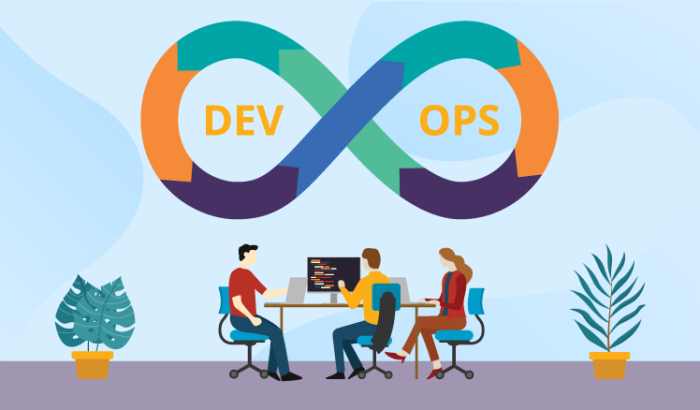Why Is DevOps Important? – Top 10 Primary Reasons
Looking for Why Is DevOps Important and what are the primary reasons, then hold on for this detail guide on this.
As the world of technology rapidly advances, businesses are looking for ways to keep up and stay competitive. This is where DevOps comes in – a methodology that helps organizations move faster and be more efficient. As IDC projects, the market for DevOps is foreseen to rise from $2.9 billion to $8 billion by 2022. Here are the top 10 reasons why DevOps is so important and why it is getting more attention from IT businesses.
What is DevOps?

When it comes to the software development process, DevOps is a term you’ve probably heard quite a bit lately. But what exactly is it and why is Devops important? Simply put, DevOps refers to a set of practices that helps organizations speed up their software development process by automating and optimizing the way they work. In today’s fast-paced world, businesses need to be able to adapt to changes and new demands from their customers quickly. DevOps can help them do that by allowing them to develop and release new software faster and more efficiently.
Top 10 most significant reasons why is DevOps important to software development projects
-
DevOps can help save costs, time, and resources
One of the biggest advantages of DevOps practice is that it can help you save not only money but also distribute time and resources more efficiently. By automating repetitive and mundane tasks and optimizing your workflow to the fullest, you can eliminate waste and reduce costs due to stagnance along the way. In addition, DevOps can help you improve your utilization of resources in exchange for higher productivity and ROI.
-
DevOps aids in efficiency increase
As your repetitive tasks are handled automatically, you can free up time for more important tasks and prioritize productivity and quality of work instead. In addition, by optimizing your workflow, you can eliminate bottlenecks and improve the overall efficiency of your team and their work.
-
DevOps help ensure quality
Quality is the decisive factor in any software development process. With DevOps practice implemented nicely within your workflow, you can somehow make sure the quality of your software will meet your expectation by automating testing and providing feedback early and often. In addition, DevOps can help you identify and fix problems quickly before they become expensive and time-consuming to fix.
-
Businesses can gain better customer satisfaction with DevOps
Satisfied customers are the important key to any successful business and software product. Therefore, DevOps plays an integral part in improving customer satisfaction as it allows you to secure quality, as mentioned above, and keep your product optimized by quickly fixing bugs and adding new features effortlessly. In addition, by automating your testing process, you can ensure that your software can satisfy customer expectations when it comes to their hands. This is one of the reasons why is DevOps important for such businesses that wants to achieve customer satisfaction.
-
DevOps can shorten the time to market
In any business sector, time is the key to winning the competitive edge against the competitors, and it is still true in the software development industry. The factor that strongly affects the success of a new software product is how fast it can be delivered to the market. Time to market is the amount of time it takes for a product to be developed and released to the market. DevOps can help you shorten your time to market by automating tasks and optimizing your workflow. In addition, by continuously delivering new features and fixes, you can quickly respond to customer demands.
-
DevOps Facilitates Better Communication and collaboration
In order to succeed, businesses need to have good communication and collaboration among their teams. DevOps can help facilitate better communication and collaboration by providing a common set of tools and practices. In addition, by using automation, DevOps can help reduce the need for manual communication and coordination.
-
DevOps Can Help You Achieve Consistency
One of the biggest concerns of software development is maintaining consistency across different environments. DevOps can help you achieve consistency by automating the provisioning and configuration of your infrastructure. In addition, by using a common set of tools and practices, you can ensure that your teams are working with the same code base and configurations.
-
DevOps Can Help You Improve Security
Security is always the critical concern for any business. DevOps can help improve security by providing a way to quickly identify and fix security vulnerabilities. In addition, by automating tasks, DevOps can help reduce the chance of human error.
-
DevOps enables scalability
Scalability is the capability of a software system to handle the increased load without impacting performance. DevOps can help you improve scalability by automating the provisioning and configuration of your infrastructure. In addition, by using a common set of tools and practices, you can ensure that your teams are working with the same code base and configurations.
-
DevOps Improves business agility
Business agility is the ability of a business to adapt to changes in the market quickly. DevOps can help improve business agility by allowing you to quickly develop and release new software. In addition, by automating tasks and optimizing your workflow, you can eliminate bottlenecks and shorten the time it takes to get new features done and available to the market.
Challenges of Implementing DevOps Practice
Everything has two sides, and so does DevOps. Businesses need to have an overview of the advantages and disadvantages of DevOps in order to decide whether to implement it into their workflow or not and why they should do that. We have gone through the advantages or the reasons why DevOps is important, not it is time to look at the challenges:
1. Implementation of DevOps is not easy:
The biggest challenge with DevOps is the implementation. It can be difficult to implement DevOps in an organization as it requires a change in the culture and mindset of the people. In addition, DevOps also requires a lot of coordination and communication among different teams.
2. The learning curve can be steep:
Another challenge with DevOps is the learning curve. DevOps requires a lot of new tools and technologies, which can be difficult to learn for some people. In addition, the coordination and communication required by DevOps can also be challenging for some organizations.
3. Requires much time and effort:
DevOps is a complex process, and it requires a lot of time and effort to implement. Additionally, it can be difficult to find the right people with the necessary skills to implement DevOps.
4. Security risks:
DevOps can also pose some security risks as it can give developers too much access to production systems. In addition, if not implemented properly, DevOps can also lead to chaos and disruption.
5. Can be expensive to implement:
DevOps can also be expensive to implement as it requires a lot of new tools and technologies. In addition, it can also be difficult to find the right people with the necessary skills to implement DevOps.
6. Can be disruptive to the organization:
DevOps can also be disruptive to the organization as it requires a lot of changes in the way the organization works. In addition, DevOps can also lead to chaos and disruption if not implemented properly.
7. Requires coordination and communication among different teams:
DevOps also requires a lot of coordination and communication among different teams. This can be difficult to achieve in some organizations.
8. It Can be difficult to maintain consistency across different environments:
DevOps can also be difficult to maintain consistency across different environments. This is because DevOps requires a lot of changes in the way the organization works.
9. Can impact the security of the system:
DevOps can also impact the security of the system as it can give developers too much access to production systems. In addition, if not implemented properly, DevOps can also lead to chaos and disruption.
10. Not suitable for all organizations:
DevOps is not suitable for all organizations. This practice is best suited for organizations that are willing to change the way they work. On the other hand, DevOps is not suitable for those that are not willing to invest in new tools and technologies and that is why it should be known to them that why is devOps important for their businesses.



